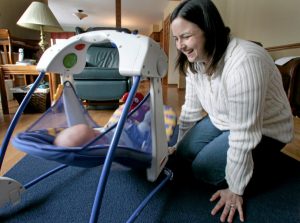A Woman’s Perspective: Diabetes, Alzheimer’s Present Burdens for Women

Next month is National Diabetes Awareness Month. It is also National Alzheimer’s Disease Awareness Month. It’s important for everyone — especially women — to learn more about these two ever-growing diseases.
The burden of diabetes on women is unique because the disease can affect mothers and their unborn children. Diabetes can cause difficulties during pregnancy such as a miscarriage or a baby born with birth defects. Women with diabetes are also more likely to have a heart attack, and at a younger age, than women without diabetes.
Healthy eating habits and exercise go a long way in preventing diabetes, and in helping people with diabetes. Health-care teams are successfully working together, developing special meal plans and regular exercise programs for patients with diabetes to use glucose without extra insulin, and helping to combat insulin resistance. Of note, it is important for diabetes patients to work with health-care professional teams for guidance and support and to never start an exercise program without medical advice and supervision. A relatively new book, “A Woman’s Guide to Diabetes: A Path to Wellness” by Natalie Strand and Brandy Barnes, is an excellent resource for knowledge-sharing, as is the American Diabetes Association’s website (www.diabetes.org).
When talking about Alzheimer’s disease, it is always important to point out that women are the epicenter of the disease because they represent the majority of people with the disease and caregivers for the disease. A woman’s estimated lifetime risk of developing Alzheimer’s at age 65 is 1 in 6, compared with nearly 1 in 11 for a man. As real a concern as breast cancer is to women’s health, women in their 60s are about twice as likely to develop Alzheimer’s over the rest of their lives as they are to develop breast cancer.
The mission of the Alzheimer’s Association is to eliminate the disease by advancing research; to provide and enhance care and support for all affected; and to reduce the risk of dementia through the promotion of brain health. The association’s website (www.alz.org) has a plethora of timely information on the disease and related research.
Two other organizations focused on Alzheimer research and effective treatment are Marin’s Buck Institute for Research on Aging (www.thebuck.org) and the UCLA Mary S. Easton Center for Alzheimer’s Disease Research (www.eastonad.ucla.edu). A recent study jointly conducted by both organizations suggests that memory loss in patients may be reversed, and improvement sustained, using a complex, 36-point therapeutic program that involves comprehensive changes in diet, brain stimulation, exercise, optimization of sleep, specific pharmaceuticals and vitamins, and multiple additional steps that affect brain chemistry.
While global research on diabetes and Alzheimer’s disease continues year-round, raising public awareness on these two diseases will be a priority next month. Join in an awareness campaign, and help draw attention to these two diseases with facts and knowledge.
To read the original article for the Marin Independent Journal, click here.
The Marin Independent Journal welcomed Dr. Lizellen La Follette as their health columnist from 2015-2018. Her A Woman’s Perspective column appeared every fourth week in the Journal during these 3 years.
